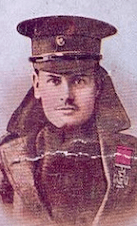Geoffrey Woolley facts for kids
Quick facts for kids
Geoffrey Woolley
|
|
|---|---|
 |
|
| Birth name | Geoffrey Harold Woolley |
| Born | 14 May 1892 Bethnal Green, London, England |
| Died | 10 December 1968 (aged 76) West Chiltington, West Sussex, England |
| Buried | (50°57′16″N 0°27′00″W / 50.954425°N 0.449911°W) |
| Allegiance | United Kingdom |
| Service/ |
British Army |
| Years of service | 1914–1920, 1940–1944 |
| Rank | Major |
| Unit | London Regiment Royal Army Chaplains' Department |
| Battles/wars | First World War Second World War |
| Awards | Victoria Cross Order of the British Empire Military Cross |
| Relations | Sir Leonard Woolley (brother) George Cathcart Woolley (brother) |
Geoffrey Harold Woolley (born May 14, 1892 – died December 10, 1968) was a brave British soldier and a priest. He served in the British Army as an officer and later as a military chaplain. He is famous for being the first officer from the Territorial Army to receive the Victoria Cross. This is the highest award for bravery given to British and Commonwealth soldiers.
Early Life and Education
Geoffrey Woolley was born in London. His father, George Herbert Woolley, was a clergyman, which is a type of priest. Geoffrey had many brothers and sisters. One of his brothers, Leonard Woolley, became a famous archaeologist. Another brother, George Cathcart Woolley, was a colonial administrator.
Geoffrey went to school at Parmiter's School and St John's School, Leatherhead. He then studied at The Queen's College, Oxford. He planned to become a priest, just like his father. However, the First World War began, and his plans changed. He joined the British Army as an officer in the Queen Victoria's Rifles. This was part of the London Regiment.
Bravery in the First World War
Geoffrey Woolley's unit, the Queen Victoria's Rifles, was sent to a dangerous area called the Ypres Salient in Belgium. In April 1915, British soldiers captured a small hill known as Hill 60. The German army tried very hard to take it back.
On April 20, 1915, Second Lieutenant Woolley and his company were sent to deliver ammunition to the soldiers defending Hill 60. The fighting was very intense. Many soldiers and all the other officers on the hill were killed. Woolley was the only officer left. He was told to pull back, but he refused. He said he and his men would stay until they were properly replaced.
Through the night, Woolley and his small group fought off many attacks. He kept throwing bombs and encouraging his men. The area was heavily shelled and bombed by the enemy. When they were finally replaced the next morning, only 14 of his 150 men were left.
For his incredible bravery, Geoffrey Woolley was awarded the Victoria Cross. The award citation said he showed "most conspicuous bravery" by successfully defending his trench against all attacks.
Just two days later, Woolley was promoted to the rank of Captain. He continued to fight in the Second Battle of Ypres. He later became unwell from poison gas and the stress of war. He was sent back to England to recover.
After recovering, he became an instructor for officers. He returned to the Western Front in 1916. After the war, he received another award, the Military Cross, for his services.
Life After the War
After the First World War, Geoffrey Woolley went back to Oxford. He continued his studies to become a priest. In December 1920, he was ordained, meaning he officially became a priest. He then took a teaching job at Rugby School.
In 1923, he left the army and became a vicar in a church in Hampshire. Later, he became a chaplain at Harrow School. A chaplain is a priest who works in a school or other institution.
In 1940, when the Second World War began, Woolley joined the army again. He became a chaplain in the Royal Army Chaplains' Department. He was appointed Senior Chaplain in the Algiers area in 1942. He reached the rank of Major. In 1943, he was awarded the Order of the British Empire (OBE) for his services in North Africa.
His son, Rollo, was a Spitfire pilot. He was also sent to North Africa and sadly died in battle in December 1942.
In 1944, Woolley became the priest for St Mary's, Harrow on the Hill. In 1952, he moved to West Grinstead, Sussex, where he worked as a rector until he retired in 1958.
Images for kids
-
Geoffrey Woolley's grave at St Mary's Church, West Chiltington, Sussex
 | Jackie Robinson |
 | Jack Johnson |
 | Althea Gibson |
 | Arthur Ashe |
 | Muhammad Ali |


